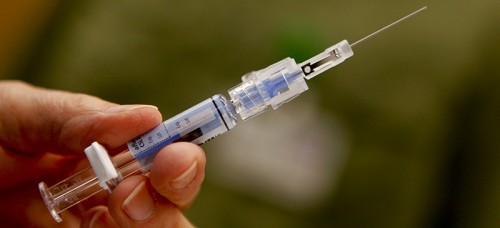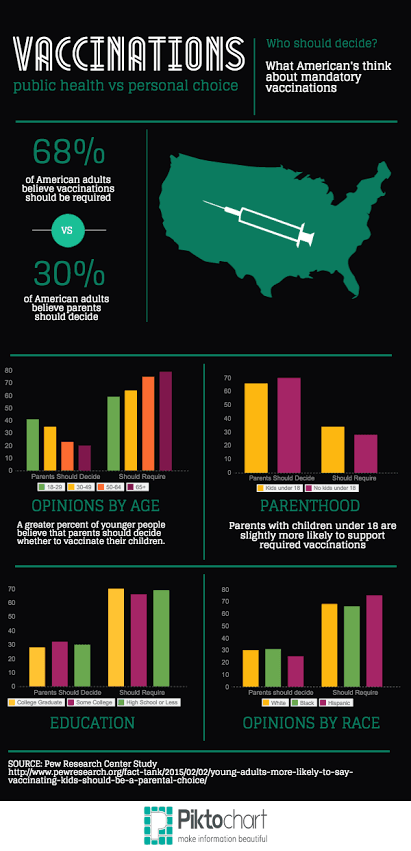
Following an outbreak traced to Disneyland by the Center for Disease Control, the highly infectious measles came roaring back to life in the United States with the opening of 2015.
The re-emergence of a disease that was eradicated from U.S. soil in 2000 has also ignited a fierce debate over the nature of vaccines: Should their usage be mandated as a public health concern, or do American citizens have the right to choose?
Small outbreaks of measles have not been uncommon in the past decade. In these cases, officials have cited foreign travel of unvaccinated or vulnerable individuals as the root cause, and the number of cases has hovered well below 200 annually, according to the CDC.
That is, of course, until recently. In 2011, the number of cases jumped to 222. In 2014, measles had its best year since its eradication with 644 cases reported.
Even with 2014 in hindsight, 2015 is already on track to feature an even larger outbreak. The official count is now at 121 cases stretched across 17 states, according to the CDC. Consequently, much of the nation has directed blame towards Disneyland’s home state of California.
The Golden State has one of the most lenient vaccination exemption policies in the country. Thousands of children in kindergarten are able to attend without proper vaccinations. More than 1,500 of the state’s daycares boast immunization rates at or lower than 92 percent, according to the Los Angeles Times. Experts believe that 92 percent is the lowest percentage of public immunization that can effectively prevent a large-scale measles outbreak.
In addition, the New York Times reported that in Orange County, California, some schools have less than 60 percent of their kindergarteners fully vaccinated. Other schools reported 20 to 40 percent of parents filed for an exemption for vaccination requirements, citing personal beliefs.
The Anti-Vaccination Movement, as it has become known, finds its roots in a paper published in 1998 by Lancet, a prestigious medical magazine. It proclaimed a link between the MMR (Measles, Mumps, Rubella) vaccine and autism. Naturally, the public became petrified as the media went into a frenzy.
However, in the years that followed, countless studies found no connection between the vaccine and any serious health problems. The author was eventually labeled a fraud by the greater medical community, lost his medical license and the paper was denounced as “utterly false” by Lancet’s editor in 2010 when the paper was fully retracted.

Still, the fear felt in 1998 lives on. The “anti-vaxxers,” as pundits have taken to calling them, have received much of the blame for the pervasiveness of the most recent outbreak. The demographics of those infected highlight the impact that the movement continues to have in California: According to the LA Times, almost 60 percent of those infected are over the age of 20, despite measles being commonly known as a childhood disease.
Measles has always been of particular concern to children. This is especially true for infants, who cannot receive the vaccine until they turn one year old, putting them at substantial risk. This stresses the importance of vaccination as a public health concern. More than protecting oneself from disease, vaccinating a community of healthy individuals protects those who are vulnerable. This effect has been coined by scientists as “herd immunization” or “herd protection.”
Despite that, and despite an astronomically huge body of scientific evidence supporting the safety and cumulative public good of vaccinations, fear still exists in California and in the anti- vaccination movement. The fear has been led, funneled and fueled by figures such as Jenny McCarthy and Rush Limbaugh, who have advocated strongly for the American citizen’s right to choose. Even the Internet isn’t without blame, according to visiting associate public health professor Suzanne Carlberg-Racich of DePaul University.
“The internet is so fabulous and awful at the same time,” Carlberg-Racich said, “because you can always find information … that supports your fear. There are people that can validate any fear who appear to have credentials or some level of notoriety,” referring specifically to Mrs. McCarthy, whose son is autistic.
In the past few weeks, commentators and columnists have weighed in heavily on the vaccination debate. Many of them have asked why there exists a debate in the first place, but others have vexed over the impossible question: how do you argue with someone on a scientific topic who rejects scientific knowledge?
Again, fear plays its timeless part. According to Carlberg-Racich, the response to such a deeply rooted fear can never be admonishment.
“I don’t think we get anywhere by judging people,” she said, saying that, while the anger at anti-vaccine parents may be justified, “Judging people with that fear is not going to make them go along with anything — it’s just going to make them dig in their heels.”
The question becomes, according to Carlberg-Racich, “How do you have an open and collaborative conversation with someone where they are allowed to express their fears, raise questions, consider the evidence and the impact of their decision on the community at large?”
“There’s a way to do that,” she said. “It takes listening to people, and trying as best you can to process all of the things involved in that decision and all of its effects.”


Hannibal / Feb 17, 2015 at 12:13 am
Egypt reached the pinnacle of its power during the New Kingdom, in the Ramesside period where it rivalled the Hittite Empire, Assyrian Empire and Mitanni Empire, after which it entered a period of slow decline. Egypt was invaded or conquered by a succession of foreign powers, such as the Canaanites/Hyksos, Libyans, the Nubians, the Assyrians, Babylonians, the Achaemenid Persians, and the Macedonians in the Third Intermediate Period and the Late Period of Egypt. In the aftermath of Alexander the Great’s death, one of his generals, Ptolemy Soter, established himself as the new ruler of Egypt. This Greek Ptolemaic Dynasty ruled Egypt until 30 BC, when, under Cleopatra, it fell to the Roman Empire and became a Roman province.[3]
Hand N. Yell / Feb 16, 2015 at 1:08 pm
My concerns will disappear when the grave concerns of these most highly-respected vaccine science researchers are addressed:
“Why the Press Shouldn’t Dismiss Vaccine Skeptics”
…This wholesale demeaning of vaccine skeptics defies explanation. Granted, kooks and quacks exist in the vaccination field, just as they exist elsewhere. But why taint the skeptics as a whole, and fail to respectfully report dissenting views? No journalist would have had any difficulty finding dozens of distinguished skeptical scientists for the very few “rogue” scientists that the press has vilified.
How hard, for example, should it have been for the press to notice the views of Dr. Bernadine Healy, the former head of the National Institute of Health, the former head of the American Red Cross, and the former Chair of the White House Cabinet Group on Biotechnology, one of several White House positions she held in service to three U.S. presidents.
Dr. Healy criticized the public health establishment for being “too quick to dismiss [vaccine concerns] as irrational…The more you delve into it, if you look at the basic science, if you look at the research that’s been done in animals, if you also look at some of these individual cases, and if you look at the evidence… what you come away with is that the question [of vaccine safety] has not been answered.”
Dr. Healy’s views would have been particularly easy to find because they were actually aired by one of America’s leading journalists Sharyl Attkisson of CBS News, in one of the rare instances in which the mainstream press fairly presented a skeptic’s perspective on the vaccine issue.
Journalists should also have had no trouble finding Dr. Diane Harper, a lead developer of the controversial Gardasil vaccine and another interviewee of Attkisson’s. Dr. Harper believes this vaccine, which is being recommended for teens and pre-teens to combat cervical cancer, is less effective than the common Pap smear, and that it may harm more children than it helps. “Parents and women must know that deaths
occurred,” she stated in arguing that parents need to know that they could be subjecting their children to needless risks.
Journalists might have sought the views of skeptics among academics. At the University of British Columbia, for example, researchers Chris Shaw and Lucija Tomljenovic in the Faculty of Medicine state that the cervical cancer vaccine may lead to death among susceptible members of the population.
Their views have been quite public, as were those of Professor Walter
Spitzer of McGill University, considered Canada’s “dean” of
epidemiology. In 2002 testimony to a U.S. Congressional committee hearing into the safety of various childhood vaccines, he matter-of-factly stated that, based on the evidence to date involving one of the vaccine combinations under scrutiny, “I cannot recommend it … for my own grandchildren.”
Finally, journalists who place special stock in the credibility of
government scientists might have noticed the views of none other than Peter Fletcher, former Chief Scientific Officer at the UK’s Department of Health.
Dr. Fletcher was also the Medical Assessor to the Committee on Safety of Medicines, and thus the very person who determined for the UK government whether vaccines were safe. Dr. Fletcher has several times gone public with his concerns over vaccines, and with his frustration
that “no one in authority will even admit [a vaccine-related problem
could be] happening, let alone try to investigate the causes.”
Those who are labelled as anti-vaccination rogue scientists are hardly
rogues — they are found at the pinnacle of the medical establishment.
And they are hardly anti-vaccination. All of the scientists that I
mention in this article value vaccines for the great good that they can do. Their opposition is to mass vaccination of the population, which discounts the risk that people with certain predispositions can react badly to various vaccines, just as people with certain predispositions can react badly to various prescription drugs.
Identify the vulnerable populations, the skeptics say, so that all can be confident when vaccines are administered. For this, they deserve our appreciation, not our ridicule.
(By Lawrence Solomon, research director at Toronto-based Consumer Policy Institute, columnist, Huffington Post, Posted 01/06/2014 12:41 pm EST Updated: 03/08/2014 5:59 am EST)